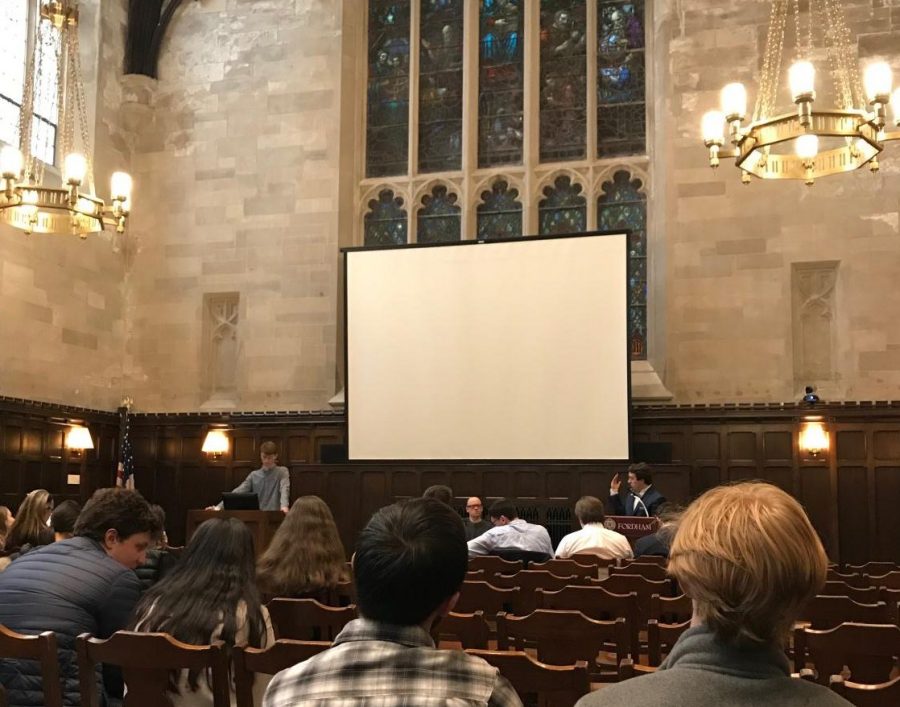College Democrats, Republicans Debate Border Wall, Free College and More
In a debate between the Fordham College Republicans and Democrats, students came together to discuss pertinent issues facing our world today in a civil manner. Topics included such issues as President Donald Trump’s proposed wall along the U.S. southern border, subsidizing public college tuition and a possible military withdrawal from Syria.
April 11, 2019
It was a heated night on Tuesday, April 9 at Fordham Rose Hill’s Tognino Hall, as students from both Fordham’s College Democrats and College Republicans took to the podium at Fordham Political Review’s Spring Semester Debate.
The debate’s purpose to give both Republicans and Democrats a chance to come together to discuss pertinent issues facing our world today in a civil manner. Topics included such issues as President Donald Trump’s proposed wall along the U.S. southern border, subsidizing public college tuition and a possible military withdrawal from Syria.
This semester’s debate followed the same pattern commonly utilized by the Fordham Political Review. Each party’s representative was allotted two minutes to introduce their stance on the topic, followed by back-and-forth from the representatives for two rounds of 90 seconds each. The public was allowed to ask questions of both representative questions for eight minutes. Each representative gave an approximately one minute closing statement after they had been questioned.
Jacob Floam, Fordham College at Rose Hill (FCRH) ’20, took the stage first for the College Republicans. Floam took a strong stance in support of Trump’s border wall, arguing that even while most of the illegal drugs and human trafficking victims arrive through legal ports of entry, the U.S. Border Patrol is still straining to cover all territory. With a wall, “we can relocate them to our 48 points of entry,” he opined.
The College Democrats’ Jack Pettus, FCRH ’21, countered, arguing that the crisis at the border is manufactured by the president for his own gain. “There’s been a 75 percent decrease in illegal border crossings in the last 20 years,” he said.
Sean Franklin, FCRH ’21, argued in support of tuition-free public college for the Democrats. He explained that this plan will increase the competitive landscape of the U.S. economy through equality of opportunity, adding that education shouldn’t be seen as a commodity. “It represents real value to employers,” he stated.
The Republicans’ Domenic Setaro, FCRH ’20, disagreed, arguing that the reason college costs are so ballooned in the first place is a result of public scholarships which entice colleges to raise their price to offset an increase in demand. He also added that “college is something that should be earned,” not given for free.
While most of the debate was fiercely dichotomized by partisanship, the final round of discussion on withdrawing U.S. troops from Syria pitted both a Democrat and a Republican against another Republican.
College Republicans member Dane Salmon, FCRH ’21, and Democrats’ representative Tim Koubek, FCRH ’22, teamed up against Tim Kyle, FCRH ’21, of the College Republicans. Salmon and Koubek both insisted that regime change is dangerous, ineffective and costs the United States the lives of soldiers.
Kyle opposed the idea that when there is no clearly stated goal in a foreign operation, the U.S. should pull its troops.
“Political bravado has no place in determining U.S. foreign policy,” he declared. He added that leaving the region could potentially open up a power vacuum in which adversaries like Russia and Iran could take advantage of a relatively-weakened Syria, eerily reminiscent to the rise of ISIS in Iraq after the assassination of Saddam Hussein.
At times, the debate became heated amidst partisan rhetoric and tough questions from the audience, but at the end of each round, all representatives across parties cordially shook hands with one another. At its conclusion, the Democrats and Republicans could even be seen standing together, laughing and conversing.














